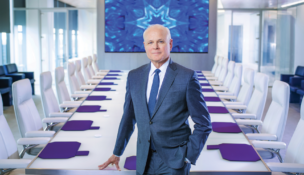DXC penalized by SEC over misleading financial info
Fortune 500 IT company ordered to pay $8M fine
DXC penalized by SEC over misleading financial info
Fortune 500 IT company ordered to pay $8M fine
Ashburn-based Fortune 500 IT company DXC Technology Co. has been penalized by the federal government for making “misleading” financial reports from 2018 to early 2020, according to the U.S. Securities and Exchange Commission. DXC did not admit or deny the charges, but consented to a cease-and-desist order and agreed to pay an $8 million penalty.
The $8 million SEC penalty must be paid within 28 days of the order Tuesday. The SEC reported that DXC “materially increased its reported non-GAAP net income by negligently misclassifying tens of millions of dollars of expenses as non-GAAP adjustments for so-called transaction, separation and integration-related (TSI) costs and improperly excluding them from its non-GAAP earnings.”
DXC overstated its income by $83 million over three quarters in fiscal years 2019 and 2020, according to the SEC order. It misclassified certain expenses as transaction, separation and integration-related (TSI) costs when reporting non-GAAP — or general accepted accounting principles — income to investors. “Reasonable investors would have considered the … information to have been material in deciding whether to purchase DXC securities during the relevant period,” the order says.
In a statement, DXC said it had cooperated with the SEC and resolved the matter, which it said was related to its formation in 2017 from the merger of Computer Science Corp. and the Enterprise Services business of Hewlett Packard Enterprise Corp.
“DXC Technology has resolved this legacy matter, which related to the presentation of non-GAAP M&A costs principally related to the 2017 merger that formed DXC,” the company said in a statement. “Our current management team has proactively clarified its disclosure, reduced these non-GAAP costs and cooperated fully with the SEC, and is happy to put this matter behind us.”
The SEC report said that during 2018 through early 2020, members of DXC’s controllership reviewed the company’s TSI costs for accuracy and compliance to SEC standards. The former assistant corporate controller for external reporting questioned certain costs that were characterized as TSI costs but often received “inaccurate or incomplete information,” and often received answers to their questions orally, without written records of “how particular issues were resolved,” according to the SEC.
GAAP is a set of accounting standards followed by most businesses and the public sector, and are created and administered by the Financial Accounting Standards Board and the SEC, according to The Motley Fool. Companies use non-GAAP earnings to make their net income look better, often by eliminating non-recurring or other charges. A common form of non-GAAP measurements are earnings before interest, taxes, depreciation and amortization, or EBITDA.
By misclassifying TSI costs, the company “materially overstated its non-GAAP net income in three financial quarters” and “failed to evaluate the company’s non-GAAP disclosures concerning TSI costs.”
The SEC found that DXC “negligently violated the anti-fraud provisions of the Securities Act of 1933 and reporting provisions of the federal securities laws.”
In addition to paying the $8 million, DXC promised to develop and implement “appropriate non-GAAP policies and disclosure controls and procedures,” which must be completed within the next 120 days.
During the SEC’s investigation, DXC voluntarily undertook a review of its TSI practices and made witnesses available, according to the order. It also has replaced “nearly all of its senior executive and financial leadership personnel who were present during the relevant period.”
Last week, DXC ended buyout talks after a “financial sponsor” — revealed by Bloomberg as Baring Private Equity Asia last year — failed to raise enough capital. In late September 2022, DXC had been approached by the private equity firm and worked with advisers on the potential takeover.
Chairman, President and CEO Mike Salvino was Virginia’s highest paid CEO in 2021, with his pay totaling $28.7 million, a 32% raise from 2020. DXC posted $16.265 billion in 2022 revenue, down 8.26% from 2021, which also saw a 9.44% decline from DXC’s 2020 revenue, $19.577 billion. Salvino joined the company in 2019 and moved the headquarters from Tysons to Ashburn in 2021 as it moved to a hybrid-friendly workplace.
n

















